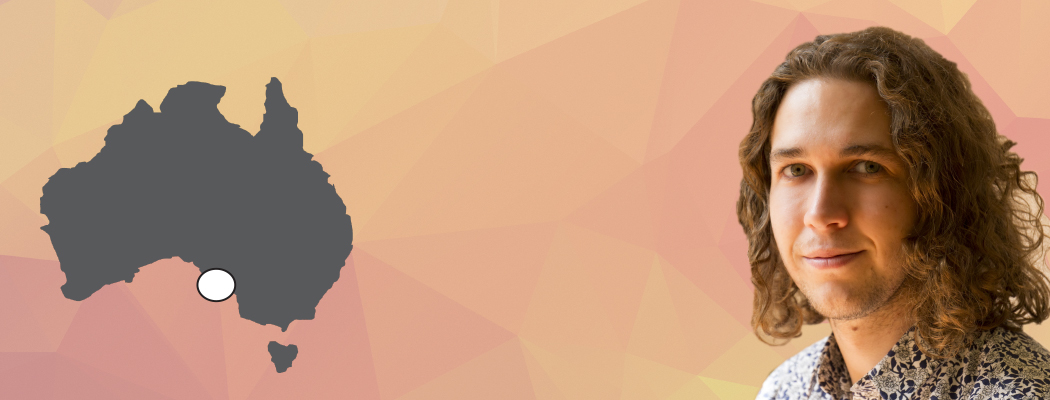Benjamin, we love the piece you composed for the 2017 Australasian Piano Pedagogy Con-ference and are so excited to share it with Piano Teachers all around Australia in this edition of The Piano Teacher. We would love to get more insight into your start as a composer!
Q: Tell us about how you came to learn the piano?
A: I started learning piano in unusual circumstances. What should have been a routine roof climbing adventure turned hazardous. The house is double storied and the roof is of an unusually steep pitch. I was perched right at the top. With help I managed to return to ground level unscathed but after seeing me precariously atop the house mum was concerned. Cleverly, she sat me down at a digital keyboard with a beginner piano book. By the end of the day it was decided that I would take lessons. My grandparents were talented pianists and so from an early age I heard Chopin and Mendelssohn performed in their home. Grandpa doubled as my private piano tutor during school holidays, and he also supported my studies in countless other ways, including upgrading the digital keyboard to an acoustic piano and finding me a teacher.
Q: Do you have any favourite memories of your teachers?
A: I am from rural South Australia and was very fortunate to have lessons in Balaklava with Di Spence until finishing High School. She is a very passionate voice and piano teacher and always encouraged me to compose. I remember listening to her vocal students before my lessons and revelling in the beauty of the human voice. Her studio was a place where music was cherished and shared. It was a very special place for me growing up. I am now studying piano in Adelaide with Anna Goldsworthy and Eleonora Sivan. It is a privilege to study with such inspirational teachers and to be continually reminded of the communicative power of music. My piano playing and musical understanding has been transformed under their tutelage.
Q: What does an average week look like for you? What keeps you busy?
A: Currently I am undertaking a double degree. I am studying for a Bachelor of Music and a Bachelor of Arts, majoring in Classical Piano Performance and History, at the University of Adelaide. Study and piano practice fill my week quite comprehensively, but I try to play tennis whenever I can and teach piano one day a week.
Q: Is there a genre of repertoire that is your favourite to play?
A: I have always loved to play the music of the Romantic composers, particularly Chopin. However, Shostakovich holds a special place for me, and more recently I have been fascinated with the music of Rodion Shchedrin. Although, as soon as I settle on a particular style as a favourite I remember how much I enjoy playing Bach, or Mozart, or Rachmaninoff. My favourite, it seems, is piano.
Q: Has composition always been something you’ve done? What styles of music to you enjoy composing?
A: I have always improvised and this has, more often than not, crystallised into pieces of a more fixed form. I think it is only in the last few years that I have been developing more theoretical frameworks for my compositions, and have been experimenting more deliberately. I mainly compose piano solo works and my compositions usually fall into neo-classical or neo-romantic styles, but I think I am moving in a slightly different direction at the moment.
Q: Can you step us through your creative process? What process do you go through when you are composing?
A: My approach to composition is still evolving but I am almost always at the piano improvising at first. I am constantly refining ideas through improvising and once I have some material I attempt to un-derstand how it operates. If I can define it somehow, then I can expand upon it. For me this balance is important. I find that I am very honest when improvising, but feel the need to push my instincts in different directions through formal and theoretical considerations. Sometimes it feels like archeology, at first chipping away at submerged outlines, and then trying to apply finer tools. I think I will always be pursuing a more precise musical vocabulary.
Q: What advice would you have for a student beginning to compose? Or for teachers including composition in their lessons?
A: Composing for me has been helped through improvising, studying theory, and learning the music of others. If you can equip yourself with musical knowledge and then make it your own by playing it on the piano, that theory becomes a very powerful tool. You will always have a slightly different perspective on music, and this is a good thing; try to develop this.
Q: Where do you dream of being in 10 years’ time? What do you see yourself doing in the future?
A: In the future I see myself as a music educator, focusing on composition and performance. Music has an incredible capacity for personal expression, whilst also creating strong communities. It is a fundamentally human endeavour and I feel passionately about its place in society.
Q: What music do you listen to in your down time?
A: I listen to many different styles and genres, although my car’s radio is very nearly stuck on ABC Classic FM. This month I’ve been listening to an album of Rostropovich and Britten performing works for piano and cello by Schubert, Schumann and Debussy. The Debussy Sonata for Cello and Piano is one of my favourite pieces of music. I am also a big fan of Jacob Collier, a young British multi-instrumentalist, and Yosi Horikawa, a Japanese producer who extensively samples the environment in his music.
